|
|
|
Sort Order |
|
|
|
Items / Page
|
|
|
|
|
|
|
| Srl | Item |
| 1 |
ID:
069331
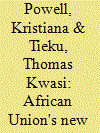

|
|
|
| 2 |
ID:
053878
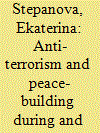

|
|
|
|
|
| Publication |
Stockholm, SIPRI, 2003.
|
| Description |
iv, 50p.
|
|
|
|
|
|
|
|
|
|
|
|
Copies: C:1/I:0,R:0,Q:0
Circulation
| Accession# | Call# | Current Location | Status | Policy | Location |
| 046728 | R 327.172/STE 046728 | Main | On Shelf | General | |
|
|
|
|
| 3 |
ID:
101151
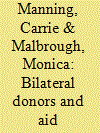

|
|
|
|
|
| Publication |
2010.
|
| Summary/Abstract |
This article examines the role of bilateral donors and conditional aid in Mozambique's successful post-war peace process. The literature on peacebuilding has tended to privilege the role of UN missions in explaining the outcomes of post-civil war peace processes. The important role that bilateral donors may play in determining these outcomes has not been thoroughly studied. In Mozambique, donors with country experience, knowledge of domestic political actors and constraints, and a shared commitment to a successful outcome, were indispensable to the success of the peace process. The article details this engagement, arguing that it was not UNOMOZ alone, but UNOMOZ as supported by the flexible responses of these donors, that provided an effective third-party guarantee of the peace agreement in Mozambique. It briefly discusses the broader implications of this finding for understanding international peacebuilding efforts.
|
|
|
|
|
|
|
|
|
|
|
|
|
|
|
|
| 4 |
ID:
068281
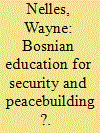

|
|
|
| 5 |
ID:
051783
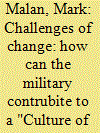

|
|
|
|
|
| Publication |
Dec 03-Feb 04.
|
|
|
|
|
|
|
|
|
|
|
|
|
|
|
|
| 6 |
ID:
067308
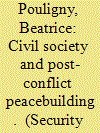

|
|
|
| 7 |
ID:
073199
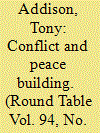

|
|
|
| 8 |
ID:
133423
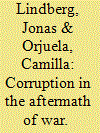

|
|
|
|
|
| Summary/Abstract |
'Corruption in the aftermath of war' brings together an interdisciplinary group of scholars to enquire into the dynamics of corruption in post-conflict societies. This introduction discusses five themes, problematising and summarising key findings from the 10 articles included. First, we discuss the problems with the corruption concept, related to its moralising connotations and definitional vagueness, and propose viewing corruption as a collective action dilemma as a way of avoiding these moralising aspects. Second, we discuss post-conflict societies, and highlight the great varieties of 'peace' that that label can refer to. We suggest that the causes, dynamics and effects of corruption in post-conflict societies bear many similarities with those in other societies, but that the post-conflict situation often generates an intensification and entrenchment of corruption-related problems. Third, we analyse the dynamics between international interveners and domestic actors, and show the contradictions and tensions in international-domestic relations. Fourth, we argue that the inter-linkages between inequality, mistrust and corruption deserve consideration in the study of post-conflict societies, and that inequality in particular merits more attention. Finally, we discuss some methodological challenges encountered by the contributors in their studies of corruption in post-conflict societies.
|
|
|
|
|
|
|
|
|
|
|
|
|
|
|
|
| 9 |
ID:
082205
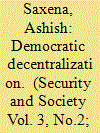

|
|
|
| 10 |
ID:
075318
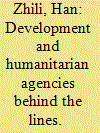

|
|
|
| 11 |
ID:
095442
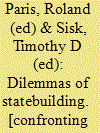

|
|
|
|
|
| Publication |
London, Routledge, 2009.
|
| Description |
xii, 366 p.
|
| Series |
Security and governance series
|
| Standard Number |
9780415776288, hkp
|
|
|
|
|
|
|
|
|
|
|
|
Copies: C:1/I:0,R:0,Q:0
Circulation
| Accession# | Call# | Current Location | Status | Policy | Location |
| 054952 | 327.172/PAR 054952 | Main | On Shelf | General | |
|
|
|
|
| 12 |
ID:
073200
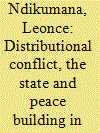

|
|
|
| 13 |
ID:
081986
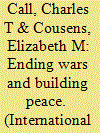

|
|
|
|
|
| Publication |
2008.
|
| Summary/Abstract |
Scholars and practitioners of international relations have devoted increasing attention to how cease-fires, once achieved, may be translated into sustained peace. In recent years, the United Nations, the World Bank, and the United States and other governments have revamped their institutional architecture for addressing post-conflict reconstruction and peacebuilding. The creation in 2006 of a UN Peacebuilding Commission exemplifies these changes. The relationship between weak states and the durability of peace has acquired new emphasis in IR research. This article analyzes recent conceptual developments in post-conflict peacebuilding, relating them to new thinking about fragile states. It then analyzes the international architecture for addressing post-conflict peacebuilding, identifying gaps, and analyzing likely policy challenges in the near future. We argue that despite important analytic insights and institutional changes, serious challenges persist in efforts to prevent wars from recurring.
|
|
|
|
|
|
|
|
|
|
|
|
|
|
|
|
| 14 |
ID:
112417


|
|
|
|
|
| Publication |
2012.
|
| Summary/Abstract |
India's role in Sri Lanka assumes more significance now than before, with the end of war and devolution of power sharing in limbo. While the LTTE is wiped out militarily and isolated internationally, the existing militarisation in Jaffna with war crime charges at UN and awaiting political solution in limbo, Sri Lanka demands India's attention. The call for India's greater engagement with Sri Lanka had resurfaced domestically with a demand from Tamil Nadu parties urging India to play a more proactive role pertaining to rebuilding and sustaining peace in post-war Sri Lanka, and in ending assault on Indian fisherman at Palk Strait. On other hand, the fostering of ties between Sri Lanka and Pakistan and China push for more primed hands-on role from the point of view of India's long-term strategic interest. There is, therefore, a need to have a re-look of India's policy options towards Sri Lanka in light of recent developments.
|
|
|
|
|
|
|
|
|
|
|
|
|
|
|
|
| 15 |
ID:
091490
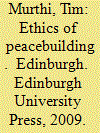

|
|
|
|
|
| Publication |
Edinburgh, Edinburgh University Press, 2009.
|
| Description |
xi, 188p.
|
| Standard Number |
9780748624485
|
|
|
|
|
|
|
|
|
|
|
|
Copies: C:1/I:0,R:0,Q:0
Circulation
| Accession# | Call# | Current Location | Status | Policy | Location |
| 054536 | 327.172/MUR 054536 | Main | On Shelf | General | |
|
|
|
|
| 16 |
ID:
114685
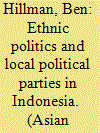

|
|
|
|
|
| Publication |
2012.
|
| Summary/Abstract |
Since Indonesia's return to multiparty democracy in 1999, national law makers have introduced regulations that effectively ban ethnic or regionally based political parties. A major exception to the rule can be found in the province of Aceh where ethnic separatists were granted the right to form their own political party to contest local elections in return for giving up their armed struggle for independence. In legislative elections held in 2009 the party of the former rebels - the Aceh Party - won a landslide victory. Drawing on in-depth interviews with national party leaders and parliamentarians, this article examines the implications of the rise of the Aceh Party for Indonesia's political party system and the potential for ethnic-based parties to resolve ethnic conflict and secessionism in other parts of Indonesia, including in Papua where the failure of special autonomy arrangements has led to increased militancy among indigenous Papuans.
|
|
|
|
|
|
|
|
|
|
|
|
|
|
|
|
| 17 |
ID:
076921
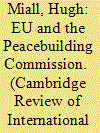

|
|
|
|
|
| Publication |
2007.
|
| Summary/Abstract |
What can the world hope for from the Peacebuilding Commission, given the record of the United Nations in this area? And what contribution can the European Union (EU) offer, given its own record in engaging with countries emerging from violent conflict? The essential task in peacebuilding is to restore a war-torn society's capacity to manage its own conflicts. The priority for the Peacebuilding Commission should be to develop international support and legitimacy for this task, avoiding muddying it with the foreign policy objectives of donor states. The EU has much to offer and much to gain from establishing this growing area of global governance on sound principles and internationally accepted lines. The paper argues that the EU can and should play a leading part in developing the Peacebuilding Commission. It reflects on principles that could be applied and practices that should be avoided
|
|
|
|
|
|
|
|
|
|
|
|
|
|
|
|
| 18 |
ID:
105403
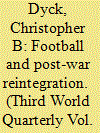

|
|
|
|
|
| Publication |
2011.
|
| Summary/Abstract |
Growing enthusiasm for 'Sport for development and peace' (sdp) projects around the world has created a much greater interest among critical scholars seeking to interrogate potential gains, extant limitations and challenges of using sport to advance 'development' and 'peace' in Africa. Despite this interest, the role of sport in post-conflict peace building remains poorly understood. Since peace building, as a field of study, lends itself to practical approaches that seek to address underlying sources of violent conflict, it is surprising that it has neglected to take an interest in sport, especially its grassroots models. In Africa, football (soccer) in particular has a strong appeal because of its popularity and ability to mobilise individuals and communities. Through a case study on Sierra Leone, this paper focuses on sports in a particularly prominent post-civil war UN intervention-the disarmament, demobilisation and reintegration (ddr) process-to determine how ex-youth combatants, camp administrators and caregivers perceive the role and significance of sporting activities in interim care centres (iccs) or ddr camps. It argues that sporting experiences in ddr processes are fruitful microcosms for understanding nuanced forms of violence and healing among youth combatants during their reintegration process.
|
|
|
|
|
|
|
|
|
|
|
|
|
|
|
|
| 19 |
ID:
108734
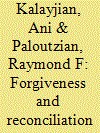

|
|
|
|
|
| Publication |
Dordrecht, Springer Science and Business Media, 2009.
|
| Description |
xxii, 303p.
|
| Series |
Peace Psychology Book Series
|
| Standard Number |
9781441901804
|
|
|
|
|
|
|
|
|
|
|
|
Copies: C:1/I:0,R:0,Q:0
Circulation
| Accession# | Call# | Current Location | Status | Policy | Location |
| 056400 | 155.9/KAL 056400 | Main | On Shelf | General | |
|
|
|
|
| 20 |
ID:
081232
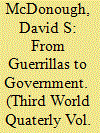

|
|
|
|
|
| Publication |
2008.
|
| Summary/Abstract |
Post-conflict stability remains an elusive goal for many African countries. The political and socioeconomic preconditions of African civil wars have often persisted after the end of open hostilities and have frustrated regional and international efforts at peace building. The growing role of non-state armed groups in post-conflict governments raises further questions on the important role of guerilla groups in either exacerbating or ameliorating the 'structural' preconditions of protracted African wars. The cases of Liberia, Uganda and Rwanda offer important insights on the complex interplay between armed groups and governments that underlie these conflicts. All three countries have been marked by devastating civil wars and the subsequent formation of post-conflict governments led by respective insurgent groups, but only Rwanda and Uganda have made any effort to mitigate the conditions that ultimately led to intra-state violence and state collapse. While the conflict dynamic may heavily condition an insurgent group, these factors alone do not play a determining role in the success or failure of peace building efforts
|
|
|
|
|
|
|
|
|
|
|
|
|
|
|
|
|
|
|
|
|